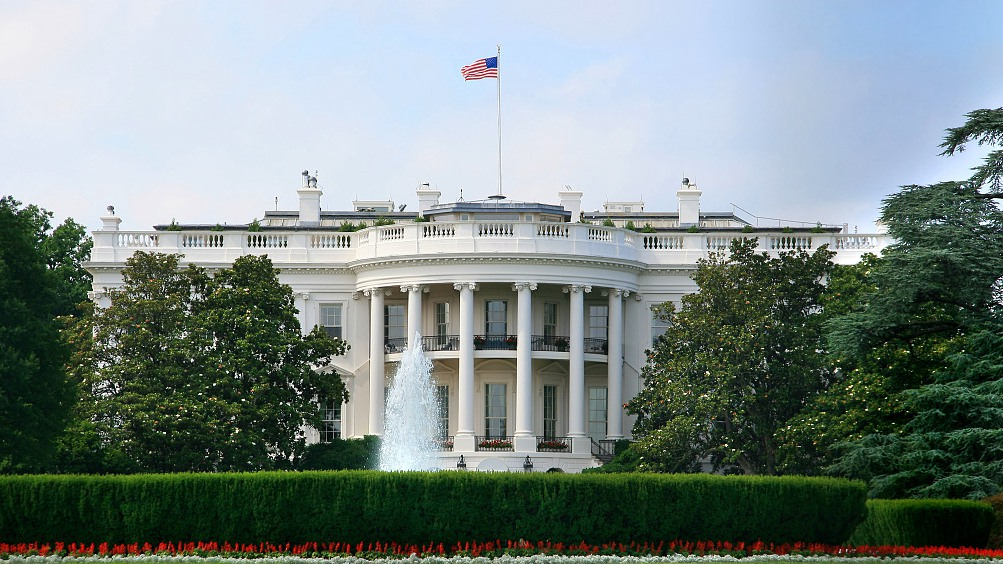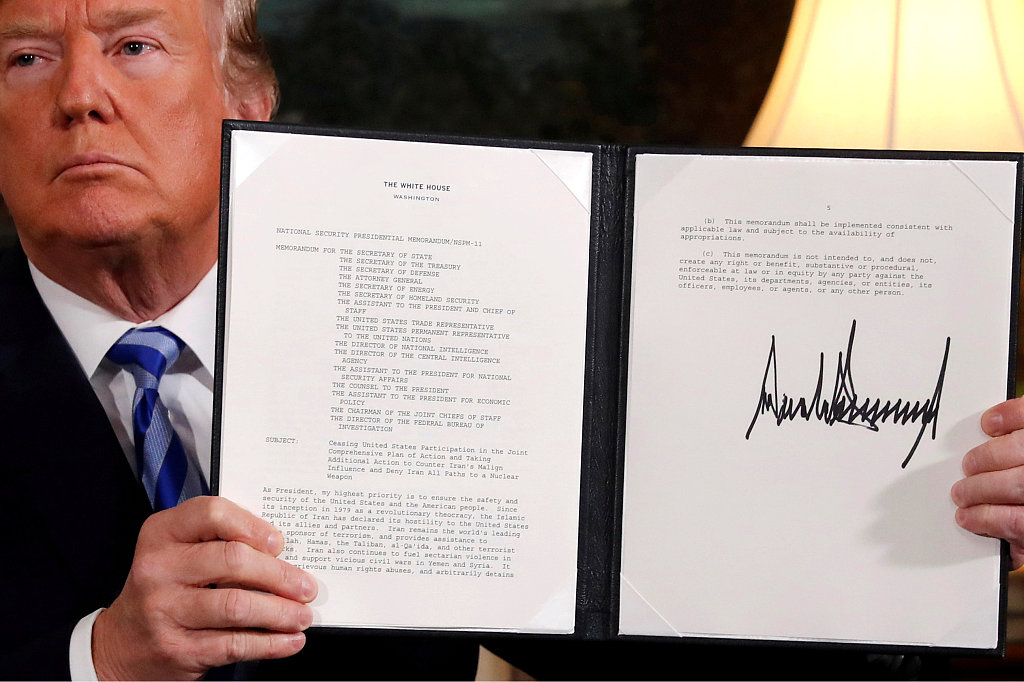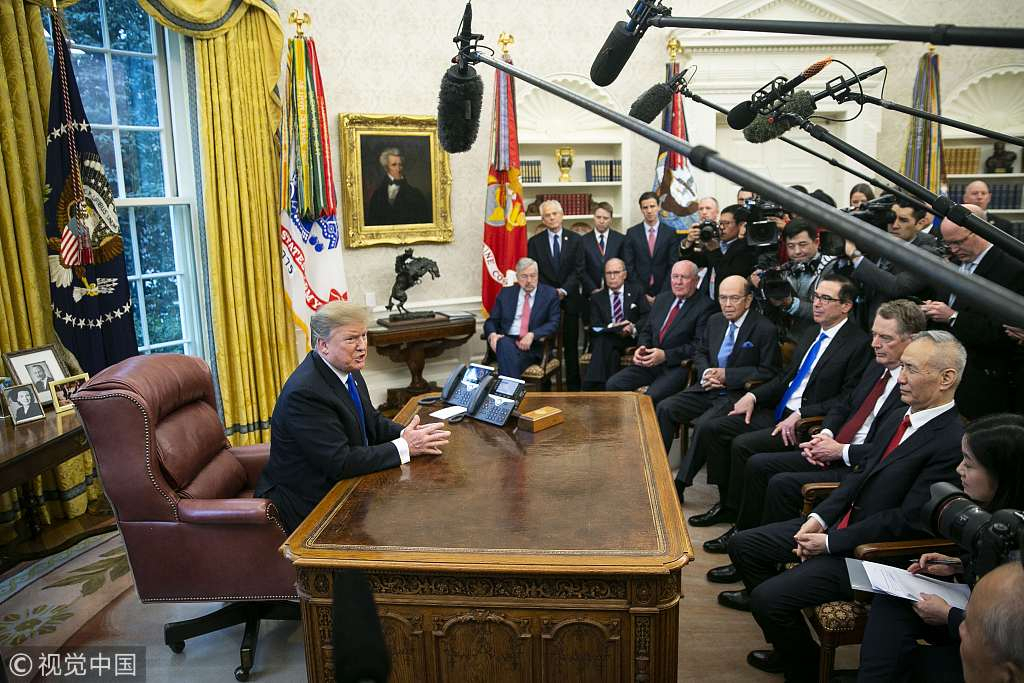
Opinion
14:58, 02-Jun-2019
How to restore the damaged U.S. credibility?
Wang Xinyan

Editor's note: Wang Xinyan is an opinion editor at CGTN. The article reflects the author's views, and not necessarily those of CGTN.
Thomas Schelling, a famous American professor of political economy and Nobel laureate, pointed out in his book Arms and Influence that "face is one of the few things worth fighting over."
Americans have always regarded their strong and reliable reputation or credibility as the pillar underpinning the world order, and they even resort to limited wars to establish a firm reputation and increase their bargaining chips in international affairs.
However, the credibility of the U.S. has eroded in recent years, because the U.S. government reneged on its commitments in a series of international affairs. Especially after the current president took office, the credibility of the U.S. has dropped to a new low.
In fact, the U.S. government has been going back on its words and behaving irresponsibly for a long time. As early as 2001, the Bush administration announced that the "Kyoto Protocol" had "fatal defects" and decided to unilaterally withdraw from it, which greatly reduced the effectiveness of the "Kyoto Protocol."

U.S. President Donald Trump holds up a proclamation declaring his intention to withdraw from the JCPOA Iran nuclear agreement after signing it in the Diplomatic Room at the White House in Washington, U.S., May 8, 2018. /VCG Photo
U.S. President Donald Trump holds up a proclamation declaring his intention to withdraw from the JCPOA Iran nuclear agreement after signing it in the Diplomatic Room at the White House in Washington, U.S., May 8, 2018. /VCG Photo
Under the Obama administration, the U.S. pushed for reconciliation with Iran and finally reached a six-party nuclear agreement, which "set free a tiger back to the mountains" in a way that betrayed the U.S.' closest ally in the Middle East, Saudi Arabia. The "treachery" of the U.S. has gradually deprived it of its influence over Saudi Arabia.
Even more reckless and unscrupulous, the current U.S. government reneges on its words with a vengeance.
As the main builder and participant of the international economic order and the multilateral system after World War II, the U.S. should have taken the lead in abiding by multilateral rules, but the U.S. government, advocating "America first," withdraws from international agreements and institutions at every turn: withdrawal from the Paris climate accord, the Iran nuclear deal, the United Nations Educational, Scientific and Cultural Organization, the United Nations Human Rights Council.
In the China-U.S. trade war, in defiance of the WTO rules advocated by the U.S. itself and the outcomes of the China-U.S. trade talks over the past year, U.S. President Donald Trump insisted on imposing a 25 percent tariff on 200 billion U.S. dollars' worth of Chinese exports to the U.S.

Chinese-made jackets at a Manhattan department store in New York City, U.S., May 7, 2019. /VCG Photo
Chinese-made jackets at a Manhattan department store in New York City, U.S., May 7, 2019. /VCG Photo
He even accused the Chinese side of "going back on its words" which once again gives the world a chance to see the true colors the U.S. government as "giving a false account of the facts."
In addition, President Trump, who has been prone to "governing the country by tweets," has taken the U.S. further down the road of dishonesty through a large number of "tweets" that have proved to be false.
Public opinion polls reported by the U.S. media show that "between two-thirds and three-quarters of Americans do not find Trump trustworthy."
According to a 2018 survey by the Pew Research Center of the U.S., Trump has become the world's least trusted leader of great power. Americans have more confidence in French President Macron, Japanese Prime Minister Abe and German Chancellor Merkel than Trump in dealing with international affairs.
At the same time, traditional U.S. allies, such as the United Kingdom, France, Germany, Saudi Arabia, Japan, South Korea, and Australia have little confidence in the U.S. president.
Although the U.S. government does not derive its credibility from the president's words and deeds alone, Trump's failure to keep promises undoubtedly carries serious consequences for the U.S. His "inconsistency in policy making" and "capriciousness" have led to a sharp decline in the credibility of the U.S. around the world, making it difficult for U.S. allies to trust the commitments made by the U.S.

U.S. President Donald Trump (L) speaks during the trade meeting with Liu He, China's vice premier, in the Oval Office of the White House in Washington, DC, U.S., February 22, 2019. /VCG Photo
U.S. President Donald Trump (L) speaks during the trade meeting with Liu He, China's vice premier, in the Oval Office of the White House in Washington, DC, U.S., February 22, 2019. /VCG Photo
According to a poll conducted by market research firm YouGov cited by SPUTNIK, a Russian media outlet, on May 13, 45 percent of Europeans believe that the U.S. is no longer a reliable security partner of the European Union.
In addition, Trump does not have political experience and does not listen to White House aides. Internationally, he often speaks carelessly and makes remarks that are not in the interests of U.S. foreign policy; domestically, in order to win the general election, he attacks the "dissidents" within the Democratic Party and the Republican Party without any scruple.
People no longer believe that he can effectively safeguard the fundamental interests and the strategic intentions of the U.S., which has led to the decline of the credibility of the U.S. government and the weakening of the U.S. deterrence. The risks of deadly miscalculation will increase.
As pointed out by a review in Foreign Affairs, a U.S. magazine, "the United States has already paid a significant price for Trump's behavior: The president is no longer considered the ultimate voice on foreign policy. Foreign leaders are turning elsewhere to gauge American intentions. With the U.S. domestic system so polarized and its governing party so fragmented, communicating intent has become more difficult than ever. The more bipartisan and univocal U.S. signaling is, the less likely it is that Trump's damage to American credibility will outlast his tenure.”
As ancient Chinese philosophers said: "In communication with his subjects, he (a king) rested in good faith"; "he who does not keep his promise can hardly act resolutely." As the most powerful country in the world, the U.S. may be used to "conquering" the world with hard power like a powerful economy and military prowess.
It must not forget that in the information age, soft power, represented by credibility, is more important than ever. If the U.S. is to achieve its goal of "America first," perhaps it should first think about how to restore its perilous credibility.
(If you want to contribute and have specific expertise, please contact us at opinions@cgtn.com.)

SITEMAP
Copyright © 2018 CGTN. Beijing ICP prepared NO.16065310-3
Copyright © 2018 CGTN. Beijing ICP prepared NO.16065310-3